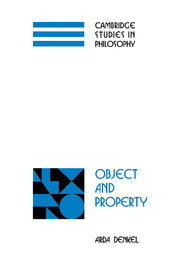Book contents
8 - Causation and particular properties
Published online by Cambridge University Press: 01 October 2009
Summary
PARTICULAR CAUSES
Causation is essentially temporal because it relates events that succeed one another. Against this one may point out that causation can admit as terms states that are not necessarily extended in time, and that some causes and effects may be simultaneous. Even if the plausibility of these points is granted individually, the fact still remains that there will be no causal relation where both hold true together. It is owing to such temporality that in momentary empirical awareness causal relations cannot be sensed in their entirety. Representing the world on a spatiotemporal map however allows ‘perceiving’ them all at once, without having to live through the relevant occurrences. Such a map shows states as persisting conditions, and events or changes as the extremities of temporally extended properties that inhere in substances. Causation links changes or conditions that occur both within the same substance, and in distinct neighbouring (but not perhaps necessarily contiguous) ones. Just as there is a causal link between a given metal bar's growing hot and its melting down into an amorphous chunk, so is there a causal link between a live coal's being hot and a closely positioned object's gaining heat. Consistently with what has been defended in the previous chapters of this book, I shall designate states and events that can be terms of causation as ‘property-occurrences’.
On the present particularistic ontology physical existence consists of particular properties and objects in which these inhere, and all generality is mind-dependent.
- Type
- Chapter
- Information
- Object and Property , pp. 228 - 247Publisher: Cambridge University PressPrint publication year: 1996



